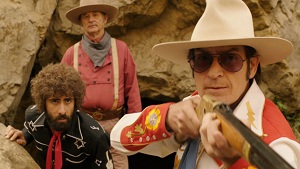 There’s no good way to approach A Glimpse Inside the Mind of Charles Swan III (henceforth referred to as Charles Swan for brevity’s sake). In large part, that’s a byproduct of the film being a complete disaster, but an alluring, charming sort of disaster, and this is where Charles Swan becomes a complicated beast. I’m not sure what else could reasonably be expected about a Roman Coppola film starring Charlie Sheen that’s so firmly about Charlie Sheen; at best that’s a recipe for rampant weirdness, and at worst for catastrophic cinematic failure. Somehow Coppola’s aim lands Charles Swan squarely in between, and what we’re left with is a bizarre Sheen mock-biography which liberally borrows from the filmography of Federico Fellini.
There’s no good way to approach A Glimpse Inside the Mind of Charles Swan III (henceforth referred to as Charles Swan for brevity’s sake). In large part, that’s a byproduct of the film being a complete disaster, but an alluring, charming sort of disaster, and this is where Charles Swan becomes a complicated beast. I’m not sure what else could reasonably be expected about a Roman Coppola film starring Charlie Sheen that’s so firmly about Charlie Sheen; at best that’s a recipe for rampant weirdness, and at worst for catastrophic cinematic failure. Somehow Coppola’s aim lands Charles Swan squarely in between, and what we’re left with is a bizarre Sheen mock-biography which liberally borrows from the filmography of Federico Fellini.
By now you’re either sufficiently turned off of the film, or you’re weirdly invested in learning more. I can sympathize with either reaction, though it’s clear– given that I’m writing this very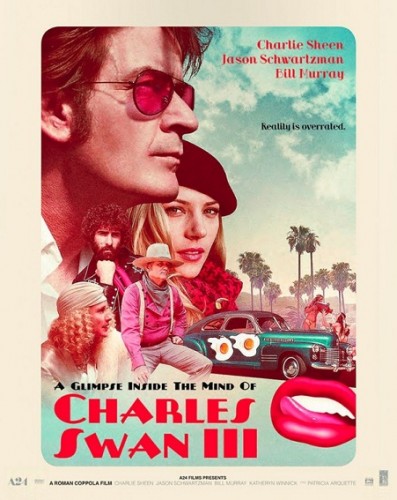 review– which category I fall under. Having watched Charles Swan for myself, I’m not sure if Coppola intended the film as an allegorical account of the last two years of Sheen’s life, as an attempt at image rehabilitation, or a grotesque novelty gag at his star’s expense; then again, I’m not really sure that it matters. You will interpret Charles Swan as Charlie Sheen: The Movie despite your best efforts. It’s simply impossible to see the movie through any other lens.
review– which category I fall under. Having watched Charles Swan for myself, I’m not sure if Coppola intended the film as an allegorical account of the last two years of Sheen’s life, as an attempt at image rehabilitation, or a grotesque novelty gag at his star’s expense; then again, I’m not really sure that it matters. You will interpret Charles Swan as Charlie Sheen: The Movie despite your best efforts. It’s simply impossible to see the movie through any other lens.
If anyone bothers to contest that claim, it’s easy enough to direct them to the film’s opening sequence, in which an off-screen doctor asks Charles Swan (Sheen) a series of questions about his personal life and his grip on reality. In one five minute scene, we learn that Swan has almost nothing on his mind but the women of his life, who he keeps tucked away in the recesses of his brain and the top drawer of dresser. It’s a tendency that leads into a break-up between Swan and Ivana (Katheryn Winnick), his young, supermodel-gorgeous girlfriend, which in turn spins Charles into a daydreaming downward spiral of procrastination, personal destruction, self-pitying, and, eventually, catharsis.
Truthfully, it seems like Charles doesn’t do much of anything apart from put off his work and indulge in fantasy scenarios anyways. Life after Ivana just feels like business as usual for him, but her departure kicks off a series of abrupt romps through Charles’ imagination and provides Charles Swan with the bulk of its plot. After the aforementioned introductory beat, we’re treated to an hour and twenty minutes of Charles chasing Ivana through the byways of his reveries; in his head, he’s a cowboy and she’s a bow-and-arrow wielding Indian, he’s a playboy bon vivant and she’s the member of a militant feminist group (The Secret Society of Ball Busters). Meanwhile, his friends and family seep into his visions, while life’s parade relentlessly marches on around him.
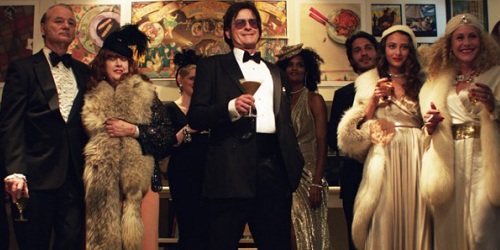
It’s hard to watch the movie without wondering if Sheen is in on the joke. Of course, Charles Swan is a far, far less volatile human being than Sheen; Charles Swan doesn’t have the shocking, unsettling power of Sheen’s public meltdown and the airing of his personal dirty laundry*. At the same time, Sheen’s real life story– divorced from its particulars– is one of personal and professional failure, just like Swan’s. Maybe Sheen saw something of himself in the script, maybe Coppola wrote the whole thing for Sheen. Whatever the case may be regarding Charles Swan‘s origins, the film is a vivid, bizarre instance of art imitating life.
And of a filmmaker imitating another filmmaker. Granted, Coppola doesn’t flat-out steal from Fellini here so much as he simply apes the Italian maestro’s great body of work; Charles Swan features notes from 8 1/2, La Dolce Vita, and even City of Women. It’s not a secret that Coppola counts Fellini among his most significant influences, so no one can really fault the lad for taking his cues from everybody’s favorite born liar, but there’s a line between ebullient homage and unimaginative mimicry. While individual bits work within context of themselves– a dance number in a graveyard, for example, which evokes the harem scene of 8 1/2— they’re never too far from their sources, to the effect of making Charles Swan feel like a film student’s Fellini tribute rather than its own picture. (Much less a picture from Francis Ford Coppola’s son.)
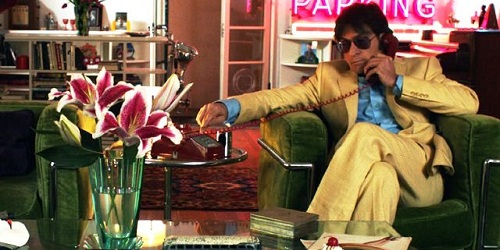
Even absent of the Fellini exultation and imitation, Coppola structures Charles Swan in such a haphazard fashion as to suggest artistic insecurity. He’s throwing every ounce of craziness he can concoct at the wall and hoping some of it sticks. In his defense, it works to a limited extent, but his kitchen sink approach smacks of self-consciousness or at least timidity. Even at its wackiest, Charles Swan reads as safe, operating within familiar oddball confines that would be right at home in a Wes Anderson film; perhaps this is unsurprising considering the work Coppola has done with Anderson on Moonrise Kindgom and The Darjeeling Limited. (Interestingly, there’s very little of a certain other Coppola present in Roman’s style.) If the associations he makes aren’t unexpected, though, that conjoining of Coppola’s many inspirations render the fledgling director voiceless.
G-S-T RULING:
Amusingly, it’s Sheen who comes out of this looking the best. Maybe that’s the point; it is, after all, his movie. Coppola hasn’t crafted a film with much to recommend by way of cohesion, but Sheen throws himself into Charles Swan with gusto. It’s more than likely that he’s scarcely acting, and mostly just being himself, but he’s fun to watch whatever his motivation might be. At the end of the day, he seems to understand what sort of movie Charles Swan should be, and it’s something of a shame that Coppola didn’t come to the same conclusion– even if the slapdash mess he’s made here is delightful in its erratic, frivolous ways.
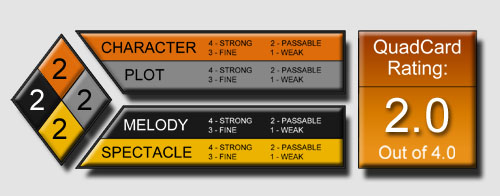
*I realize that domestic violence and drug abuse are more serious details than just “dirty laundry”.
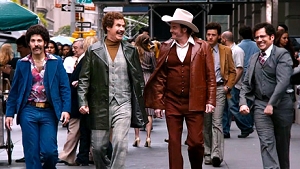
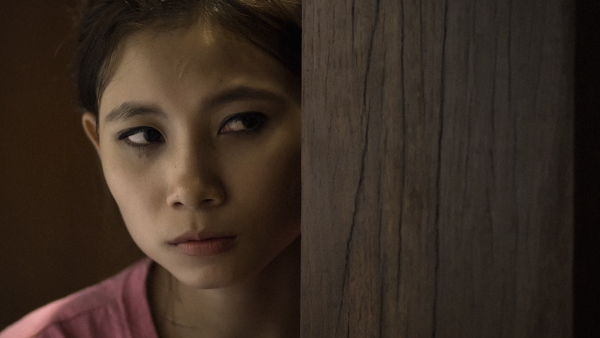
2 Comments
Dan Fogarty
Sheen definitely did represent here. I thought all of the cast did. It’s just too much of a mess, and not enough to say. Yes, obviously, there’s biogrpahical parallels but theyre not strong enough to make it a pure mock biography, so what are you left with? I had hopes for this, but they wound up dashed.
Andrew Crump
I wonder if this would have played better without all of the cribbing Coppola does, but I also don’t think he had a general idea of how this movie should have played out– which is why he breaks the fourth wall at the end. I don’t mind at all the conceit of Charles slipping into daydreams to find catharsis, I just mind that it all kind of feels empty and trite.
And yet I love this movie. I can’t help it. It’s awful, but I love it.